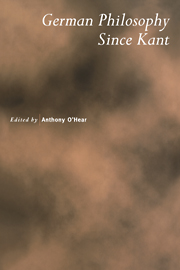Book contents
- Frontmatter
- Contents
- Preface
- Notes on Contributors
- Fichte and Schelling
- Hegel's Critique of Foundationalism in the ‘Doctrine of Essence’
- Schopenhauer's Pessimism
- Karl Marx
- Nietzsche's Virtues: A Personal Inquiry
- Bolzano, Brentano and Meinong: Three Austrian Realists
- Vorsprung durch Logik: The German Analytic Tradition
- German Philosophy of Mathematics from Gauss to Hilbert
- The Revolution of Moore and Russell: A Very British Coup?
- Husserl's Concept of Being: From Phenomenology to Metaphysics
- Frege and the Later Wittgenstein
- Otto Neurath, the Vienna Circle and the Austrian Tradition
- Does the Nothing Noth?
- Reactionary Modernism
- Adorno on Disenchantment: The Scepticism of Enlightened Reason
- Habermas, Science and Modernity
- German Philosophy Today: Between Idealism, Romanticism, and Pragmatism
- The Career of Aesthetics in German Thinking
- Hermeneutic and Analytic Philosophy. Two Complementary Versions of the Linguistic Turn?
- Index of Names
Hermeneutic and Analytic Philosophy. Two Complementary Versions of the Linguistic Turn?
Published online by Cambridge University Press: 29 September 2009
- Frontmatter
- Contents
- Preface
- Notes on Contributors
- Fichte and Schelling
- Hegel's Critique of Foundationalism in the ‘Doctrine of Essence’
- Schopenhauer's Pessimism
- Karl Marx
- Nietzsche's Virtues: A Personal Inquiry
- Bolzano, Brentano and Meinong: Three Austrian Realists
- Vorsprung durch Logik: The German Analytic Tradition
- German Philosophy of Mathematics from Gauss to Hilbert
- The Revolution of Moore and Russell: A Very British Coup?
- Husserl's Concept of Being: From Phenomenology to Metaphysics
- Frege and the Later Wittgenstein
- Otto Neurath, the Vienna Circle and the Austrian Tradition
- Does the Nothing Noth?
- Reactionary Modernism
- Adorno on Disenchantment: The Scepticism of Enlightened Reason
- Habermas, Science and Modernity
- German Philosophy Today: Between Idealism, Romanticism, and Pragmatism
- The Career of Aesthetics in German Thinking
- Hermeneutic and Analytic Philosophy. Two Complementary Versions of the Linguistic Turn?
- Index of Names
Summary
In a series of lectures on German philosophy ‘since Kant’, the names of Fichte, Schelling, and Hegel and their critical reference to Kant are, of course, a must. No less a must, though, would seem to be Wilhelm von Humboldt, a philosopher and linguist who, together with Herder and Hamann, formed the alliterating triumvirate of a romanticist critique of Kant. The response, within the discipline, to transcendental philosophy from this side was, in contrast to the idealistic mainstream, long in the coming but, in the end, rich in consequences. It was Heidegger who, looking back at Humboldt, and informed by the Humboldtian tradition of linguistics, first recognised the paradigmatic character of hermeneutics as continued by Dilthey. At about the same time, Wittgenstein, in turn, discovered a new philosophical paradigm in Gottlob Frege's logical semantics. What later was called the ‘linguistic turn’ thus came about in a hermeneutic and an analytic version.
My interest here is to see how these two relate to each other. I will look upon it, however, from a special angle. The tension between Critical Rationalism and Critical Theory which, in the early 1960s, vented itself in the polemics between Popper and Adorno, concealed another opposition with political as well as philosophical connotations.
- Type
- Chapter
- Information
- German Philosophy since Kant , pp. 413 - 442Publisher: Cambridge University PressPrint publication year: 1999
- 1
- Cited by



